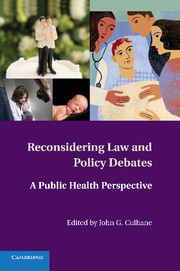Book contents
- Frontmatter
- Contents
- Contributors
- Introduction
- Part I Birth and Death
- Part II The Limits of Civil Rights
- 3 Dying While Black in America: Maslow's Hierarchy of Need and Racial Policy Making
- 4 Public Health and Marriage (Equality)
- Part III Dimensions of Violence
- Part IV Beyond Compensation: Public Features of Private Litigation
- Index
- References
4 - Public Health and Marriage (Equality)
Published online by Cambridge University Press: 06 December 2010
- Frontmatter
- Contents
- Contributors
- Introduction
- Part I Birth and Death
- Part II The Limits of Civil Rights
- 3 Dying While Black in America: Maslow's Hierarchy of Need and Racial Policy Making
- 4 Public Health and Marriage (Equality)
- Part III Dimensions of Violence
- Part IV Beyond Compensation: Public Features of Private Litigation
- Index
- References
Summary
Until quite recently, one could have accurately stated that the public debate about same-sex marriages was almost entirely focused on rights and morality: Must the law treat same-sex couples the same way it treats their opposite-sex counterparts? What messages, positive or negative, are we sending by allowing gay couples to marry? Are gay unions morally equivalent to straight ones? As anyone who's read a newspaper, watched television, or scanned the internet is well aware, this loud national conversation has played out – at times viciously – in a charged political context. Even the terms of engagement have been a bone of contention. Those favoring marriage rights for same-sex couples have coined the term “marriage equality” to make the point that basic principles of fairness and treating like cases alike compels recognition of same-sex couples' unions, whereas the most virulent opponents place the word marriage into alarmed and ironic quotation marks – homosexual “marriage” – to signal that, in their worldview, such unions can never be true marriages, even if the law deems it otherwise.
This debate is vital and continues at an almost breathless pace. In 2009 alone, only the most fervent of partisans could have kept up with the seemingly endless developments, as the nation (and the world) continued to lurch forward – and backward – on the matter of marriage.
- Type
- Chapter
- Information
- Reconsidering Law and Policy DebatesA Public Health Perspective, pp. 89 - 122Publisher: Cambridge University PressPrint publication year: 2010

